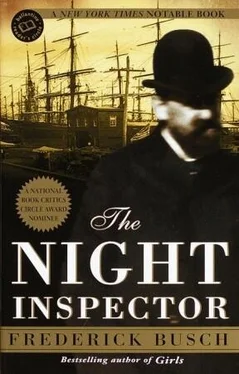She smiled with what I thought was a true affection of some sort. It was early afternoon, and the strong light fell across her face and bosom and the deep cherry tones of her desk. Her eyes grew lighter, I thought, and I felt, as often I did, that she knew a great deal more than most of us.
“You find me beautiful?”
“I find you beautiful.”
“And I, Billy, find you deep and dark and very frightening. And I smell soaps on your skin, or oils. And a kind of — fish? Do you eat something made from fish? Where do you spend your hours away from me? Do I know you, still?”
“I do not intend to be a different man. Nor do I mean to be — what was it? Deep? Frightening?”
“No. You were made so. You were tempered and constructed and made hard.”
“Not so hard as I may seem.”
She smiled. “I know that. I know you when you’re soft, and when terribly hard. No one knows you as I do. Will you come close now and forgive me for thinking of our transactions in Florida instead of here? While I forgive you for simply leading a life away from mine? I am imprisoned here as much as I take refuge, you know.”
“No,” I said, although I was tumescent and all but trembling for her. “I would rather serve you in these matters to your satisfaction than wag my tail and beg for mine. You have transmitted to them the name of the dock and the hour it is best to arrive?”
“You know precisely what I have transmitted,” she said, standing and moving toward her bed. “We have just discussed what I have transmitted. Would you, Billy, please come here?”
It is called a whipsaw, and we used them in the forest near Paynes Corners. Two men are required for efficiency, and each tugs, then pushes, on a vertical wooden handle at either end of the four- or five-foot saw. You push and then pull, push and then pull, to saw through downed trees or, working sideways, to cut down standing timber. It is called a whipsaw, as well, when you are cut at or torn in two directions, back and forth, so that, no matter your efforts, you are pulled and then pushed until you are cut apart. She said, undoing the tiny garnet-colored buttons that went from her neck to her waist — I had estimated twenty of them, talking to her over the little writing desk—“Will you come to me?”
“Sometime in the small hours,” I told him, “when he is the night inspector. He can give the orders to off-load, and I will have a carter operating that cargo boom.” Its ropes smacked the long shaft of the boom as the warm but welcome winds came up. “Not that there isn’t risk, Sam. Never mind the river police or someone from Customs deciding to pop in. He may give them his permission to unload. But he is required to have a certificate from the Collector of Customs. If it is sought by someone, then hell is come to the Port of New York.”
“Don’t worry about me,” Sam said, grinning like a boy. He waved his notebook in the air. “I am but a concerned journalist protecting the public weal. I was there, Honored Magistrate, in the interest of the body politic and, I admit it, a good story for the Boston Weekly Advertiser . But you, Billy? And our distinguished friend?”
I said nothing.
“Emulating dear old Abe, tell them. Tell them you’re freeing the slaves. Now, why would you keep that a secret from me, Billy?”
“I should not have. I am engaged in the matter because of a friend. She—”
“Ha! A she! The one with the children who think you a ghost?”
“They merely call me Ghost. And no, it is not she.”
“Another one, Billy! You have kept your powder dry. And now you spend it all. Her identity is the secret, then?”
“It is all a secret, Sam. I must have your hand on the matter of your silence.”
He offered it, saying, “Until it is done. And then I may write it?”
“Until it is done.”
She left the last two buttons, at the waist, for me, requiring that I undo each one by myself, and help her to pull the dress down over her hips, and then remove her camisole, and then the rest. She smelled like lemons at first, and then like fresh-baked bread.
“Billy,” Sam was saying, “and then I may write it. Yes? You would have to shoot me down to keep me from telling this story, you know.”
Telling, telling, telling: It was Sam’s madness, perhaps because of the War, and perhaps what carried him — my accuracy notwithstanding — through the perils of the War. Now we stood, Sam and M and I, at the curbing of the cobbled street early in the morning. We had gathered for coffee, Sam late as was common with him, for he walked to us from the Astor, and was always halted by some sight, a New York sight, he would call it, which he wrote to retell to his editor in the hope of earning his expenses back. He had a small story about M, and a large city to describe, which pulsed like a wound, and the need to tell what he had seen or, I suppose, imagined on the basis of whatever he had seen.
We were gathered, with the sun slanting through the cross streets, at the corner of Murray and West Broadway, crumbs still clustered at the base of M’s beard from the sweet French rolls he had eaten, and Sam was of course engaged in capturing a scene for his notebook. Seven or eight urchins, all dressed in filthy clothing, some of which was little more than rags — short pants or canvas overalls, few shoes in evidence, little sign of hygiene except for the heads of a few that had been shaved against lice — were seated at the curbing, where the stones abutted a cement ditch, into which some of them hung their feet, inches above the effluvium of the streets, which included the manure and urine of horses, one of which lay three feet from the children. Its body was bloated, its eyes and ears were covered with flies, and its front hooves touched the curbing as if it tried to brace itself against the continual falling away that was its death.
The children had gathered because of the horse, I thought, but now were accustomed to it, and sat, some with their back to it, chattering with serious, old faces and ignoring us. Men at carriages and outside warehouse doors spoke idly and passed one another and went to their work. The boys spoke, and one laughed. The one who neither spoke nor laughed, a tall fellow of seven or so, carried what seemed to me to be a bow for a cello or bass fiddle. He held it with some delicacy, and I thought, of course, of the lieutenant I had killed as he’d stopped playing and emerged from his tent in time to see the colonel go over and then to receive a bullet of his own.
Sam had a look of terrible concentration, and I wondered whether it was the smell of the horse as its rotting began, or the sad adult sense of limitations accepted which we could see in the children’s faces; and then I understood: He was thinking of Sergeant Grafton, killed by his terrified horse, and then, of course, he was thinking of the horse, which, after all, he had destroyed.
So I waited for Sam, the teller, to begin his tale. However, in the sound of the chatter of the boys, and in the general din and motion, it was M who spoke up first. He said to no one in particular, while he gazed at the boys and at the horse, “I, for myself, have made up my mind to be annihilated.” He wore his little badge, for he was on his way to his job, and he carried in his hand a book, the title of which I could not see and about which I was little concerned.
I said, because politeness required it, “Annihilated? You mean killed?”
“Something will kill me, shipmate,” he said. “But no. I mean the moments after the agent of my destruction sees to my death. I mean the afterlife we hope for and in which some believe. I mean that when I am finished, I am finished.”
Sam looked studious. He fished in his pocket for another pencil, the one, I presume, having dulled with overmuch use. I thought M looked deranged.
Читать дальше












